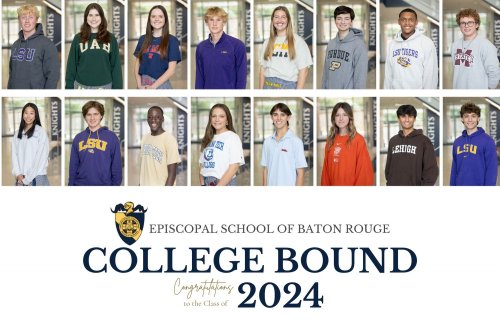- Discover Episcopal
- Admission
- Our Program
- Athletics
- Arts
- Spirituality
- Student Life
- Support Episcopal
- Alumni
- Parent Support
- Knightly News
- Contact Us
- Calendar
- School Store
- Lunch Menu
- Summer Camps
« Back
Blind Dates in Fourth Grade?
January 15th, 2021

Fourth graders recently went on a blind date…with a book. The Blind Date with a Book event officially launched the new fourth grade book club. Teacher Liz Crawford wrapped each potential book and wrote short hints about what was inside on the cover. Similar to speed dating, students rotated around four tables in the QUEST Center in Foster Hall, reading the hints to determine which book they wanted to read with their group. After the groups tallied their top choices, students submitted them to Crawford and enjoyed the sweet treats she had provided to make the occasion truly special.
Why would a teacher go to such lengths to allow students to choose a book? Oftentimes, teachers assign students a book and everyone simply begins reading. Crawford says the goal of establishing a book club is to help students connect to reading. Setting up an event to begin creates a level of excitement among the class. “The craziest thing is that it worked,” says Crawford with enthusiasm. Students were thrilled to participate in the book selection process and even more excited when Crawford unveiled their choices. The excitement was so high that students discussed it with their families who were also eager to see which book their child would receive. Crawford is ecstatic that parents are engaged and that students and families are having conversations about reading.

“We learn all the time as teachers that choice and ownership are the secret sauce to teaching,” says fifth grade teacher Nicole Engstrom. “Book clubs start with choice, students feel the ownership which leads to engagement and excitement. That’s why I love book clubs, there is always a buzz in the room!!” That buzz is created because students enjoy leading the discussions, developing the guidelines for those discussions and even determining how many pages they will read each week. While the focus of the book clubs is reading, third grade teachers Amy Arceneaux and Shannon Pesson point out that students are also developing other life skills. Through the experience, students learn to work together, to take turns and how to disagree respectfully with each other. These skills and the benefits of reading are so important that the American Academy of Pediatrics issued a policy statement that “recommends that pediatric providers advise parents of young children that reading aloud and talking about pictures and words in age-appropriate books can strengthen language skills, literacy development and parent-child relationships.”


As far as the students are concerned, they simply enjoy the experience. Step into Engstrom’s classroom during book club and you immediately feel the excitement as students discuss what they’ve read with each other. Groups are gathered with books like “Theodore Boone: The Accused” by John Grisham and “A Medal for Leroy” by Michael Morpurgo in hand. There is quiet but enthusiastic chatter as they share what they’ve found in the pages. In fourth grade, Crawford says her students quickly embraced the idea of a book club. Students have asked if they can jot down notes as they are reading to prepare for the next group discussion, and they are eager for each upcoming meeting. She says giving students control over little things like book choice, discussion guidelines and goals results in them paying more attention to the skill of reading without even realizing it. “It’s more about the desire and the depth they’re willing to do it because of the desire,” she says.
Crawford and Arceneaux participated in a virtual professional development opportunity through the Teachers College, Columbia University to prepare for the book clubs. The opportunity was supported by Episcopal’s annual eFund. Arceneaux says the workshop emphasized the importance of books as a connector to a story’s characters, each other and even the world. She says the third grade book clubs look a little different from the fourth and fifth grade clubs because the younger students still frequently read aloud. In addition, teachers have to model for the eight and nine year olds how to talk about books and what they have learned.
“The Nuts and Bolts of Getting Book Clubs Up and Going” helped teachers discover new components to implement in establishing student book clubs. Students developed a constitution of rules that book club members follow. To generate excitement and spark creativity, the students also worked together to create a book club logo. Third graders chose names like The Book Hawks, The Olympic Readers and the Dirt Worms Readers.


The establishment of Lower School book clubs is a perfect example of the creativity and care with which Episcopal educators plan and lead lessons. At Episcopal, reading has always been a priority with a range of events like Battle of the Books, Project LIT and community reads. Ultimately, the hope is that students not only develop strong reading skills but also become lifelong readers. With such a commitment to the effort, we’re sure that students will be turning pages for years to come.
Have you read a great book recently? Share the title with us in the comments section below.
The Episcopal School of Baton Rouge 2024-2025 application is now available! For more information on the application process, to schedule a tour, or learn more about the private school, contact us at [email protected] or 225-755-2685.
Posted in the categories All, Lower School.
Other articles to consider
 May16Episcopal Welcomes Father Patrick Edwards as New Head Chaplain
May16Episcopal Welcomes Father Patrick Edwards as New Head ChaplainLearn more about new Episcopal Head Chaplain Father Patrick Edwards.
See Details May16Lower School Happenings - May 2024
May16Lower School Happenings - May 2024There's excitement and joy in Lower School as students wrap up the school year. Check out the latest projects.
See Details May16Future Business Leaders Benefit from Spring Lessons/Community Support
May16Future Business Leaders Benefit from Spring Lessons/Community SupportEpiscopal students participated in two real-world learning experiences – the What’s Your Bright Idea? Episcopal Pitch Contest and the annual Burkenroad Reports Investment Conference.
See Details May8College Announcements 5.10.24
May8College Announcements 5.10.24Please join us in congratulating members of the Class of 2024 as they announce their college enrollment decisions.
See Details
Categories
- All
- Admission
- Athletics
- College Bound 2019
- College Bound 2020
- College Bound 2021
- College Bound 2022
- College Bound 2023
- College Bound 2024
- Counselors Corner
- Episcopal Alumni
- Giving
- Head Of School
- Lower School
- Middle School
- Spirituality And Service
- Student Work
- The Teachers' Lounge
- Upper School
- Visual And Performing Arts
Recent Articles
- 05/16/24Episcopal Welcomes Father Patrick Edwards as New Head Chaplain
- 05/16/24Lower School Happenings - May 2024
- 05/16/24Future Business Leaders Benefit from Spring Lessons/Community Support
- 05/8/24College Announcements 5.10.24
- 05/7/24Episcopal's Addisyn Botos Will Continue Track & Field at Southern Miss
- 05/7/24Spring Sports Success!
- 05/3/24Episcopal Audiences Wowed by "The Children of Willesden Lane"
- 05/3/24Service Learning & Community Impact Students Share Thoughts on Earth Day
- 05/2/242024 Mums of Alums Luncheon Draws Large Crowd of Supportive Mums
- 05/2/24College Announcements 5.3.24











